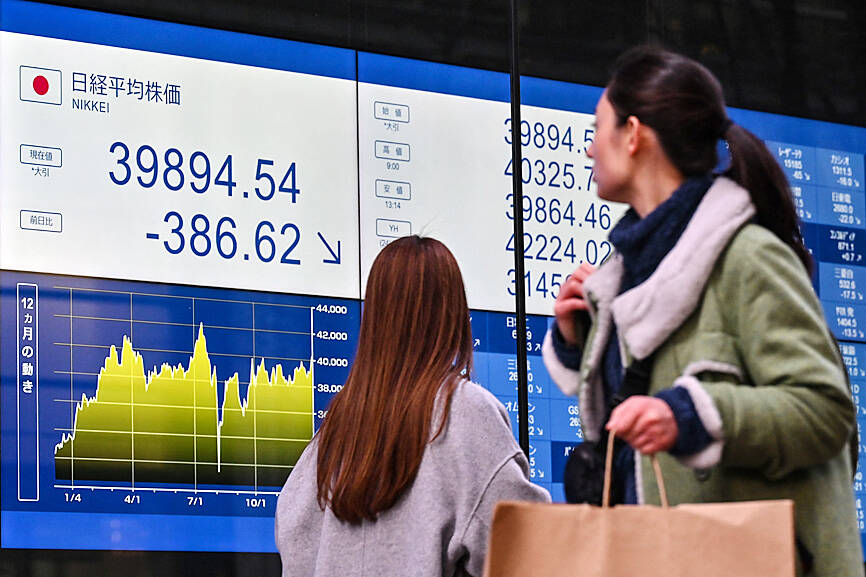Global shares yesterday retreated in thin trading as the year was ending.
Tokyo’s benchmark Nikkei 225 index ended 1 percent lower, at 39,894.54 points. The last trading session of the year ended on a somber note with the Japan Exchange Group CEO Hiromi Yamaji apologizing during the traditional year-end ceremony over a recent insider trading case.
“I acknowledge trust toward the market is essential for investors to trade with confidence,” Yamaji said.

Photo: AFP
The exchange is working to improve training and verify findings of an independent investigation, he said, adding that “we are doing are our utmost best to rebuild trust and prevent this from happening again.”
Overall, the Nikkei 225 index gained about 20 percent this year, finally surpassing the high seen before Japan’s asset bubble burst in the 1990s.
The yen was little changed after hitting 157.89 against the US dollar on Thursday, the lowest in almost six months.
South Korea’s KOSPI dropped 0.2 percent to 2,399.49 and shares of Jeju Air Co lost 8.7 percent after one of the company’s jets skidded off a runway, slammed into a concrete wall and burst into flames on Sunday, killing 179 of the 181 people aboard.
Another Jeju Air flight had to return after encountering a landing gear problem yesterday, the airline said.
Authorities ordered an inspection of all Boeing Co 737-800 aircraft operated by the country’s carriers.
The disaster was yet another blow for Boeing in a dispiriting year, following a machinists’ strike, further safety problems with its troubled top-selling aircraft and plunging stock price.
The TAIEX in Taipei was down 0.37 percent at 23,190.20.
“The TAIEX was again guided by US markets, with electronics stocks largely weaker,” Concord Securities Co (康和證券) analyst Kerry Huang (黃志祺) said.
“As many foreign institutional investors have not returned, turnover was light, leaving the TAIEX in consolidation,” Huang said.
The Hang Seng in Hong Kong lost 0.2 percent at 20,041.42, while the Shanghai Composite index gained 0.2 percent to 3,407.33. Australia’s S&P/ASX 200 dipped 0.3 percent to 8,235.00.
On Friday, the S&P 500 fell 1.1 percent. About 90 percent of stocks in the benchmark index lost ground, but it managed to hold onto a modest gain of 0.7 percent for the week.
The Dow Jones Industrial Average fell 0.8 percent and the tech-heavy NASDAQ composite fell 1.5 percent.
The losses were worsened by sharp declines for big tech stocks known as the “Magnificent 7,” which can heavily influence the direction of the market because of their large size.
Despite Friday’s drop, the market is moving closer to another standout annual finish. The S&P 500 is on track for a gain of about 25 percent this year. That would mark a second consecutive yearly gain of more than 20 percent, the first time that has happened since 1997-1998.
Additional reporting by CNA and AFP

Nvidia Corp chief executive officer Jensen Huang (黃仁勳) on Monday introduced the company’s latest supercomputer platform, featuring six new chips made by Taiwan Semiconductor Manufacturing Co (TSMC, 台積電), saying that it is now “in full production.” “If Vera Rubin is going to be in time for this year, it must be in production by now, and so, today I can tell you that Vera Rubin is in full production,” Huang said during his keynote speech at CES in Las Vegas. The rollout of six concurrent chips for Vera Rubin — the company’s next-generation artificial intelligence (AI) computing platform — marks a strategic

Enhanced tax credits that have helped reduce the cost of health insurance for the vast majority of US Affordable Care Act enrollees expired on Jan.1, cementing higher health costs for millions of Americans at the start of the new year. Democrats forced a 43-day US government shutdown over the issue. Moderate Republicans called for a solution to save their political aspirations this year. US President Donald Trump floated a way out, only to back off after conservative backlash. In the end, no one’s efforts were enough to save the subsidies before their expiration date. A US House of Representatives vote

REVENUE PERFORMANCE: Cloud and network products, and electronic components saw strong increases, while smart consumer electronics and computing products fell Hon Hai Precision Industry Co (鴻海精密) yesterday posted 26.51 percent quarterly growth in revenue for last quarter to NT$2.6 trillion (US$82.44 billion), the strongest on record for the period and above expectations, but the company forecast a slight revenue dip this quarter due to seasonal factors. On an annual basis, revenue last quarter grew 22.07 percent, the company said. Analysts on average estimated about NT$2.4 trillion increase. Hon Hai, which assembles servers for Nvidia Corp and iPhones for Apple Inc, is expanding its capacity in the US, adding artificial intelligence (AI) server production in Wisconsin and Texas, where it operates established campuses. This

US President Donald Trump on Friday blocked US photonics firm HieFo Corp’s US$3 million acquisition of assets in New Jersey-based aerospace and defense specialist Emcore Corp, citing national security and China-related concerns. In an order released by the White House, Trump said HieFo was “controlled by a citizen of the People’s Republic of China” and that its 2024 acquisition of Emcore’s businesses led the US president to believe that it might “take action that threatens to impair the national security of the United States.” The order did not name the person or detail Trump’s concerns. “The Transaction is hereby prohibited,”